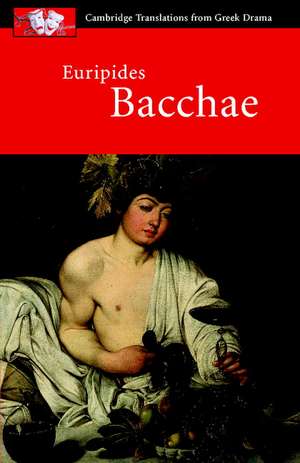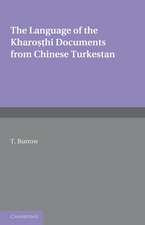Euripides: Bacchae: Cambridge Translations from Greek Drama
Autor Euripides Editat de David Franklinen Limba Engleză Paperback – 19 iul 2000 – vârsta până la 19 ani
Preț: 90.09 lei
Nou
Puncte Express: 135
Preț estimativ în valută:
17.24€ • 17.100$ • 14.23£
17.24€ • 17.100$ • 14.23£
Carte tipărită la comandă
Livrare economică 15-29 aprilie
Preluare comenzi: 021 569.72.76
Specificații
ISBN-13: 9780521653725
ISBN-10: 052165372X
Pagini: 114
Dimensiuni: 130 x 199 x 7 mm
Greutate: 0.15 kg
Editura: Cambridge University Press
Colecția Cambridge University Press
Seria Cambridge Translations from Greek Drama
Locul publicării:Cambridge, United Kingdom
ISBN-10: 052165372X
Pagini: 114
Dimensiuni: 130 x 199 x 7 mm
Greutate: 0.15 kg
Editura: Cambridge University Press
Colecția Cambridge University Press
Seria Cambridge Translations from Greek Drama
Locul publicării:Cambridge, United Kingdom
Cuprins
Introduction; Bacchae: Translation and commentary; Guide to Pronunciation of Names; Synopsis of the Play; Index
Descriere
Treating ancient plays as living drama.
Recenzii
'… predictably fine, thoughtful and polished … a nicely self-contained teaching-tool … Throughout, Mastronarde displays virtues known from his previous activity as a commentator: clarity of exposition; fairness in the treatment of controversial issues; philological acumen; command of the primary and secondary literature … a keen eye for the theatrical dimension of drama; and an openness to engage with broader, and often complex, non-philological aspects of interpretation.' Mouseion, Journal of the Classical Association of Canada
'We may confidently say now that future students will face a less difficult task thanks to the work of D. J. Mastronarde, whose knowledge of Greek theatre and uncommon talent as a teacher have combined to produce a most valuable book. It is easy to foresee that students will be grateful to M. for his admirably concise and useful treatment of language, style and metre … Mastronarde's book is an outstanding contribution to the understanding of Medea and a valuable introduction to Greek tragedy as a whole. It deserves to take pride of place on the shelves of Euripidean scholars beside the time-honoured commentary of Page.' Journal of Hellenic Studies
'… this series has consistently proven itself to provide high quality commentaries for teaching Greek texts in the original. Mastronarde's fine work does not disappoint. … this is a volume which will prove very useful to students of Greek tragedy in the original and will also be a valuable resource for professional colleagues.' Hermathena
'We may confidently say now that future students will face a less difficult task thanks to the work of D. J. Mastronarde, whose knowledge of Greek theatre and uncommon talent as a teacher have combined to produce a most valuable book. It is easy to foresee that students will be grateful to M. for his admirably concise and useful treatment of language, style and metre … Mastronarde's book is an outstanding contribution to the understanding of Medea and a valuable introduction to Greek tragedy as a whole. It deserves to take pride of place on the shelves of Euripidean scholars beside the time-honoured commentary of Page.' Journal of Hellenic Studies
'… this series has consistently proven itself to provide high quality commentaries for teaching Greek texts in the original. Mastronarde's fine work does not disappoint. … this is a volume which will prove very useful to students of Greek tragedy in the original and will also be a valuable resource for professional colleagues.' Hermathena
Notă biografică
R.A.S. Seaford is Professor of Classics and Ancient History at the University of Exeter, UK. His publications include Cosmology and The Polis: the Social Construction of Space and Time in the Tragedies of Aeschylus (2012), Dionysos (2006), and Money and the Early Greek Mind (2004).
Caracteristici
The introduction covers the development of tragedy, the ancient Greek theatre, play production, the differences between ancient and modern tragedy, Euripides' life, works and reputation, and finally the Hecuba itself



















